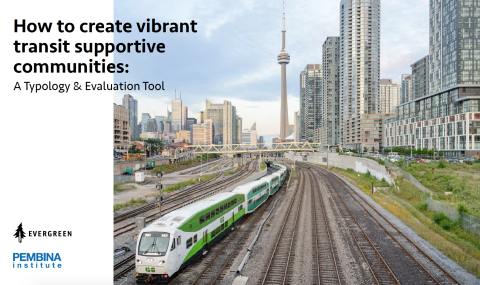Transit-supportive development is a city-building tool that creates vibrant communities that include a balanced mix of housing, jobs, shopping and services – all within walking distance to transit stations. In doing so, transit-supportive development helps municipalities meet growth management objectives and spur economic development in urban centres that leverages existing and planned investments in public transit.
The Pembina Institute and Evergreen have developed a typology and evaluation tool – co-designed by planning and policy practitioners working across the public, private, and non-profit sectors – to help planning authorities and actors better assess the potential for transit-supportive development based on the local context. This tool also helps relevant stakeholders identify context-sensitive policy solutions that build communities that give all individuals and families an equal opportunity to live near work or school and take public transit.






